i'm drawing a rectangle, and an ellipse, on glass.
brush = new SolidBrush(0xFF000000); //solid (i.e. non-opaque) black
graphics.FillRectangle(brush, x, y, 30, 30);
graphics.FillEllipse(brush, x+33, y-15, 30, 30);
- drawing with ellipse: it's opaque
- drawing with rectangle: it's not opaque

What is going on here?
You can see the same also applies for other colors:
brush = new SolidBrush(0xFFff0000); //solid (i.e. non-opaque) red
graphics.FillRectangle(brush, x, y, 30, 30);
graphics.FillEllipse(brush, x, y+33, 30, 30);
brush = new SolidBrush(0xFF00ff00); //solid (i.e. non-opaque) green
graphics.FillRectangle(brush, x, y, 30, 30);
graphics.FillEllipse(brush, x, y+33, 30, 30);
brush = new SolidBrush(0xFF0000ff); //solid (i.e. non-opaque) blue
graphics.FillRectangle(brush, x, y, 30, 30);
graphics.FillEllipse(brush, x, y+33, 30, 30);
brush = new SolidBrush(0xFFffffff); //solid (i.e. non-opaque) white
graphics.FillRectangle(brush, x, y, 30, 30);
graphics.FillEllipse(brush, x, y+33, 30, 30);

Conclusion: Why does:
FillEllipsewith an opaque color draw opaqueFillRectanglewith an opaque color draws partially transparent
Note: This question is very nearly a duplicate of my other question. Except this question focuses on the difference between
FillRectangleandFillEllipse- whereas that question deals with *How to draw opaque colors on glass.